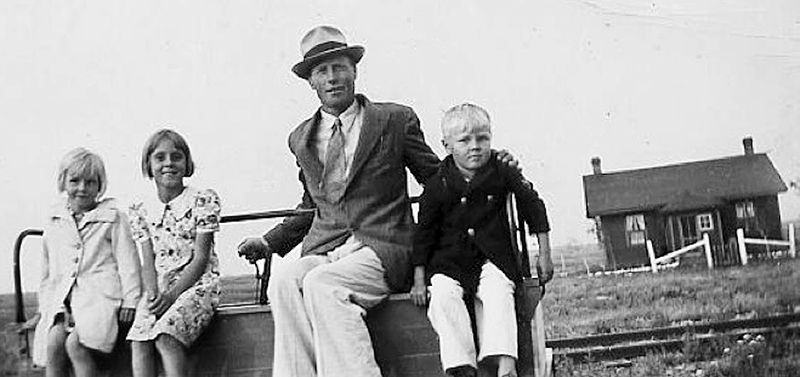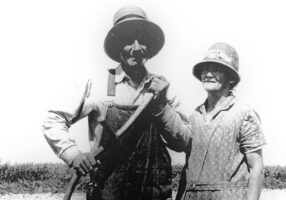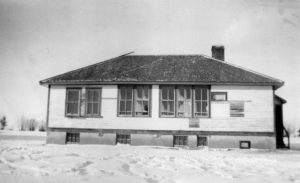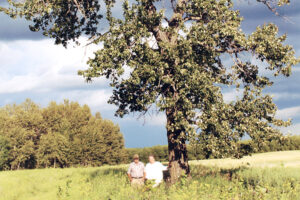
By Mickey (Larson) Lightfoot – Mississauga, Ont.
My early years were spent in a tiny village called Northgate, south of Oxbow, Sask., on the border of North Dakota. A bigger town, also named Northgate, was located a half mile south of the border on the US side.
When WWII was declared, the United States immediately closed their borders. Canadian citizens were no longer allowed to cross back and forth as they had before without a valid passport, which nobody had at that time.
Cross-border shopping was also prohibited, which was a huge problem for us. We were dependent on many necessities which couldn’t be obtained at our tiny local store. My parents immediately applied for passports but it took months. Living in such a remote area, mail delivery was only once a week.
My sister, brother, and I were born in the States and were therefore American citizens, so we became the designated smugglers for the family. We were issued special immigration cards that were stamped each time we crossed back and forth.
My only playmates lived across the line. I visited so often after school and on weekends, the immigration officers finally told me to stamp my card myself. I’d never used a stamp before and the first time I banged it stamp hard, but forgot to move my thumb out of the way. It was black and blue for days.
Sneaking under the cover of darkness
When something was needed – such as sealer rubber rings, shoes, etc. – we were sent to Mr. Leslie’s General Store across the line to buy it. He ordered shoes for us in the right sizes, but always the same style. I was tired of wearing those black patent Mary Janes year in and year out.
A culvert under the gravel road halfway between Northgate, N.D. and the customs office was a favourite hiding place for stashing our purchases. We’d drop it there before innocently checking back through customs empty-handed. After dark, we’d sneak back across the bald prairie, often chased by barking dogs and without a tree for cover, circling around to the culvert to retrieve our contraband.
One night, my father slipped over and returned with a pressure cooker. The accomplice who hid it in a designated place was probably none other than Mr. Leslie himself.
Like many of the villagers, we had chickens and two cows. Once, when the pasture gate was left open, our cows grazed their way across the border. The customs officer had to follow the rules and fined my father $5 – a whole day’s pay as section foreman – before he could retrieve them.
My father had ulcers and goat’s milk was believed to be more nutritious, so my parents got rid of the cows and replaced them with goats. One was a billy goat who lay in wait for me as I came home from school. It would chase me around the house, me screaming for my mother to open the door so I could slip through during one of my passes.
Visited soldiers
Our brown cow, Dorothy, was sold to a farmer who lived just across the line. He knew she’d be recognized by the customs officials as his pasture abutted their office, so he painted her face white and pretended it was his cow that had strayed.
When the Americans joined the war, I remember a long troop train coming through. It was held up for hours at our railroad station waiting for immigration clearance. All the kids in town, especially my teenage sisters, visited with the soldiers. They weren’t allowed off the train. Armed guards patrolled the platform the length of the train to make sure there were no deserters.
Some soldiers sent us to our little grocery store to purchase candy bars for them. They’d been on the train for days with no idea where they were headed. When they saw the Canadian flag they realized they were being sent to Alaska to help build the Alaskan highway. They were happy not to be sent overseas.



